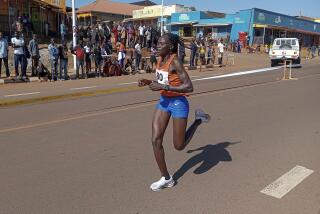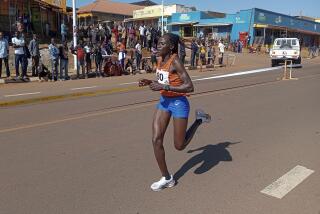Mark Whitehead dies at 50; cyclist was part of U.S. team that participated in blood doping during 1984 Summer Olympics
Mark Whitehead, a member of the U.S. track cycling team that participated in blood doping during the 1984 Summer Olympics, creating a scandal that led to the practice being banned from the sport, has died. He was 50.
Whitehead died in Frisco, Texas, while attending the USA Cycling Junior Track National Championships, USA Cycling announced Wednesday. The organization said no further details were available.
His 20 national championships included the team pursuit in 1984, which contributed to his being chosen for the U.S. squad that competed in the Los Angeles Games, the cycling website VeloNews reported.
Encouraged by their coach — and less than a week before the Olympics — Whitehead and seven other members of the U.S. cycling team took “advantage of the dubious practice called blood boosting,” David Wallechinsky wrote in “The Complete Book of the Olympics.”
The practice involves extracting blood from an athlete’s body, freezing it while the athlete’s blood makes up for the shortage, then re-injecting it just before competition. The extra blood, which carries oxygen, supposedly enhances an athlete’s stamina.
The blood doping was “ethically questionable to begin with,” Wallechinsky wrote, but the cyclists gave it “an uglier twist.”
When it was too late for them to remove and freeze their own blood before the 1984 Games, they injected blood from relatives and other people. After the transfusions, Whitehead and another cyclist became ill.
Whitehead had a 103-degree fever for 50 hours before it broke, then rode a poor race and failed to qualify for the Olympic finals, according to a 1995 article in the Allentown (Pa.) Morning Call.
“It was my choice to do it. No one made me do it,” Whitehead told the Morning Call. “We all chose to do it on our own.”
After a post-Olympics investigation revealed that a third of the 24-member U.S. Olympic cycling team had received blood-doping transfusions before their events, the practice was banned from international sports competitions in 1985.
Whitehead was born Feb. 14, 1961, in Bell and began entering cycling races when he was 11.
He traced his interest in the sport to his father, who had competed in Europe, Whitehead later recalled.
In 1978, at the age of 17, he achieved his first major international success when he made the world championship team for juniors.
The next year, The Times called him “one of the hottest young bicycle racers in Southern California.”
He was known as a temperamental competitor whose “passion for winning resulted in fiery elbow-to-elbow sprint finishes against other top competitors,” according to an online remembrance by the Valley Preferred Cycling Center, a Pennsylvania velodrome.
In 1985, he married cyclist Rebecca Twigg. They divorced two years later.
After retiring from competition in 1989, Whitehead coached some of cycling’s top athletes, including multiple world champion Sarah Hammer and short-track specialist Rahsaan Bahati.
As a coach, “my intensity and ability to motivate are great,” he told Fixed Gear Fever, an online racing information site, in 2005. “I have a great drive to succeed. On the other hand, my downfall is opening my mouth at the wrong time.”
Whitehead’s survivors include his wife and three children.
More to Read
Start your day right
Sign up for Essential California for the L.A. Times biggest news, features and recommendations in your inbox six days a week.
You may occasionally receive promotional content from the Los Angeles Times.






















































